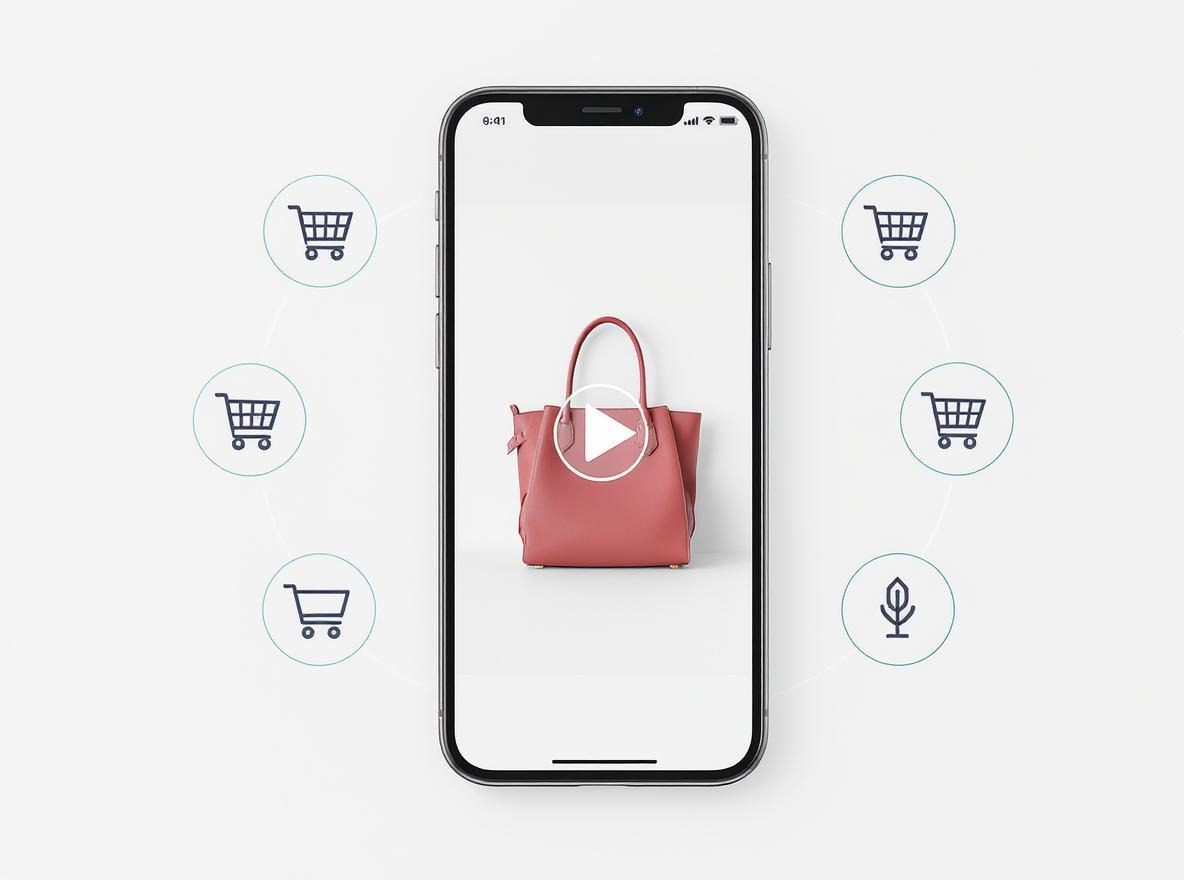Thinking about how to make your marketing efforts more effective? AI-powered personalization might be the answer. Imagine delivering content that feels tailor-made for each individual user. Let's explore how AI can transform your marketing approach and help you stay ahead of the competition.
Benefits of AI Powered Marketing Personalization
As a digital marketing manager, you’re always looking for ways to enhance customer experiences and drive engagement. But how can you ensure your efforts are hitting the mark?
Enhanced Customer Experiences
AI can deliver hyper-personalized experiences by analyzing individual preferences, behaviors, and demographics. This means each customer gets content that feels uniquely relevant to them.For instance, Netflix uses AI to recommend shows and movies based on your viewing history, while Amazon suggests products tailored to your past purchases and browsing habits. These personalized touches improve customer satisfaction by making interactions more engaging and relevant. Learn more about enhancing customer experience with AI.
Increased Engagement and Conversion Rates
Are you tired of seeing low engagement rates on your campaigns? AI improves click-through rates, open rates, and overall engagement by targeting customers with the right content at the right time. By analyzing user behavior, AI can determine the best moments to send emails or display ads, ensuring higher interaction rates.Real-world case studies show significant increases in conversion rates through AI-driven personalization. For example, companies that use AI to personalize their email marketing campaigns often see a noticeable boost in engagement and sales.
Streamlined Marketing Efforts and Efficiency
Feeling overwhelmed by the manual labor involved in segmenting audiences and crafting messages? AI automates and optimizes campaigns, reducing manual labor and improving marketing ROI. Instead of manually segmenting audiences and crafting individual messages, AI-driven tools can tailor messages to each subscriber automatically.This saves time and ensures that each customer receives the most relevant content. An example is AI-driven email marketing platforms that customize subject lines, content, and send times based on user data, leading to more efficient and effective marketing efforts. Discover how AI optimizing retail can transform your marketing strategy.
How AI Powered Marketing Personalization Works
Curious about how AI can seamlessly integrate into your current marketing strategy?
Data Collection and Analysis
AI gathers customer data from various touchpoints, including social media, website activity, and email interactions. This data collection process involves tracking user behavior, preferences, and engagement across different platforms.For example, when a user interacts with a brand's social media post, visits a product page on the website, or opens an email, AI captures these actions to build a comprehensive profile of the user. Integrating first-party data with AI tools ensures accuracy and relevance in personalization.First-party data, such as purchase history and website behavior, provides a reliable foundation for AI algorithms to analyze and predict customer preferences. This integration allows AI to deliver personalized experiences that resonate with individual users, enhancing the effectiveness of marketing efforts. Explore more about AI-powered shopping.
Machine Learning Algorithms
Wondering how AI can predict what your customers want before they do? Machine learning algorithms analyze patterns in customer data to predict behavior. These algorithms identify trends and correlations within the data, enabling marketers to anticipate customer needs and preferences.For instance, machine learning can detect that a user who frequently browses a particular category is likely interested in related products. Recommendation engines used by e-commerce platforms are a prime example of machine learning in action.These engines suggest products based on past purchases or browsing history, providing personalized recommendations that increase the likelihood of conversion.For example, if a customer frequently purchases running shoes, the recommendation engine might suggest related items like athletic apparel or fitness accessories, enhancing the shopping experience.
Real-Time Personalization
How can you keep your marketing efforts relevant in real-time? Real-time personalization involves AI adjusting campaigns dynamically based on user behavior. This means that as users interact with a brand's content, AI can modify the experience in real-time to better suit their preferences.For example, if a user shows interest in a particular product category, AI can immediately highlight relevant products or offers on the website. Brands use AI to deliver personalized experiences instantly through various channels.Customized content on websites is one such application, where AI tailors the homepage or product recommendations based on the user's browsing history. Push notifications are another example, where AI sends timely and relevant messages to users' devices, encouraging engagement and conversions.This dynamic approach ensures that marketing efforts remain relevant and impactful, driving better results. Learn more about AI digital humans and their role in real-time personalization.
AI Powered Personalization Strategies for Marketers
So, how can you implement AI-powered personalization in your marketing strategy?
Personalized Content Recommendations
AI curates and suggests personalized content by analyzing user preferences, behaviors, and demographics. This means that when a user visits your site, AI can recommend articles, blog posts, or videos that align with their interests. For instance, if a user frequently reads articles about digital marketing, AI will prioritize showing them more content in that category.This dynamic content personalization keeps users engaged and increases the time they spend on your website. By presenting relevant content, you enhance the user experience, making it more likely that visitors will return. Discover the power of AI-generated video for personalized content recommendations.
AI-Powered Email Marketing Personalization
Are your email campaigns falling flat? AI tools create personalized email campaigns by tailoring subject lines, content, and send times to individual subscribers. These tools analyze user behavior and preferences to determine the best time to send emails, ensuring higher open rates and engagement.For example, if a subscriber frequently opens emails in the evening, AI will schedule future emails for that time. Additionally, AI can personalize the email content, recommending products or articles based on the subscriber's past interactions.This level of personalization makes your email marketing more effective, driving higher engagement and conversion rates.
Predictive Product Recommendations
AI-driven recommendations predict which products or services a customer is likely to purchase based on their past behavior. By analyzing browsing history, purchase patterns, and other data points, AI can suggest products that the customer is most interested in.For example, if a customer has previously bought running shoes, AI might recommend related items like athletic apparel or accessories. Businesses using AI for predictive recommendations have seen significant boosts in cross-selling and up-selling.These personalized suggestions not only improve the shopping experience but also increase sales and customer satisfaction. Learn how AI in luxury retail can enhance your marketing strategies.
Dynamic Pricing Models
Worried about setting the perfect price point? AI enables personalized pricing by analyzing customer history, preferences, and competitive data. This allows you to offer different prices to different customer segments based on their willingness to pay.For instance, loyal customers might receive discounts, while new customers might see introductory pricing. AI can also adjust prices in real-time based on demand and competition, ensuring that your pricing strategy remains competitive and attractive. This approach helps you maximize revenue and attract a diverse range of customers.
Personalized Ad Campaigns
Struggling with ad spend and ROI? AI hyper-personalizes paid advertising by showing different ads to different users based on real-time data. This means that each user sees ads that are most relevant to their interests and behaviors.For example, if a user has been browsing for travel deals, AI will prioritize showing them ads related to travel. AI-powered programmatic ad buying increases the relevance of your ads, reducing wasted ad spend and improving ROI.By targeting the right audience with the right message at the right time, you enhance the effectiveness of your advertising campaigns. Discover how AI transforming retail can optimize your ad campaigns.
How to use AI Powered Marketing Personalization
Feeling overwhelmed by the prospect of integrating AI into your marketing strategy? Let’s break it down.
Choose the Right AI Tools
Selecting the right AI tools for personalization involves several key considerations. First, evaluate the tool's ability to handle large datasets and deliver real-time insights.Look for platforms that offer robust data analytics and machine learning capabilities. Ensure the tool integrates seamlessly with your existing marketing stack. Top AI marketing tools for personalization include HubSpot AI, which offers advanced customer segmentation and predictive analytics.Adobe Experience Cloud provides comprehensive solutions for personalized content delivery and customer journey mapping. Salesforce Einstein leverages AI to enhance CRM functionalities, offering predictive recommendations and automated workflows.
Integrate with Existing Marketing Platforms
Worried about how AI will fit into your current systems? Integrating AI tools with your existing CRM, email marketing, and e-commerce platforms is vital for seamless personalization. Start by ensuring compatibility between the AI tool and your current systems. Use APIs and connectors to facilitate data flow between platforms.This integration enables a unified view of customer interactions, enhancing the accuracy of personalized campaigns. Smooth integration involves setting up data pipelines that allow real-time data exchange. This ensures that customer data from various touchpoints, such as social media, website activity, and email interactions, is consistently updated.Regularly test the integration to identify and resolve any issues promptly, ensuring that your AI-powered marketing ecosystem operates efficiently.
Data Privacy and Ethical Considerations
Concerned about data privacy and compliance? Addressing data privacy concerns is paramount when using AI for personalization. Ensure that your data collection practices comply with regulations like GDPR and CCPA.Implement transparent data policies that inform customers about how their data will be used. Obtain explicit consent before collecting personal information. Balancing personalization with user trust involves using data responsibly.Avoid over-personalization that might make customers uncomfortable. Regularly audit your data practices to ensure compliance and maintain customer trust. Use anonymization techniques to protect sensitive information while still leveraging data for personalization.Compliance with data protection regulations requires staying updated on legal requirements and industry standards. Implement robust security measures to safeguard customer data. Train your team on data privacy best practices and ensure that all marketing activities align with ethical guidelines.
Future Trends in AI-Powered Marketing Personalization
Wondering what the future holds for AI in marketing?
AI and Hyper-Personalization
AI is moving towards hyper-personalization, offering even more granular customization for individual consumers. This means delivering content, products, and experiences that feel uniquely tailored to each person. Imagine a shopping experience where every recommendation, every piece of content, and every interaction feels like it was designed just for you.AI achieves this by analyzing vast amounts of data, including your browsing history, purchase behavior, and even social media activity, to create a detailed profile. This profile helps brands deliver experiences that are not just relevant but deeply personal.Predictive personalization is another significant shift. Here, AI doesn't just react to your past behavior but anticipates your future needs. For example, if you frequently purchase running gear, AI might predict when you'll need new shoes based on your buying patterns and suggest them before you even realize you need them.This proactive approach ensures that brands stay one step ahead, offering solutions before problems arise, and making the shopping experience smoother and more satisfying. Learn more about the AI revolution in retail.
Voice and Conversational AI for Personalization
How can voice assistants and chatbots enhance personalization? Voice assistants like Alexa and Siri, along with chatbots, are becoming integral to personalized interactions. These tools use natural language processing to understand and respond to user queries in a conversational manner.As these technologies evolve, they are becoming more adept at understanding context and intent, making interactions more seamless and natural.Conversational AI is not just about answering questions; it's about creating a personalized dialogue. For instance, a voice assistant can recommend products based on your previous purchases or browsing history. If you ask about the weather, it might also suggest appropriate clothing from your favorite brands.Chatbots on e-commerce sites can guide you through the shopping process, offering personalized recommendations and even completing purchases for you. This level of personalization makes interactions feel more human and less transactional, enhancing the overall customer experience.
AI and Augmented Reality in Personalization
Excited about the possibilities of augmented reality? AI is set to integrate with augmented reality (AR) to deliver highly personalized experiences. Imagine trying on clothes virtually before making a purchase or seeing how a piece of furniture would look in your living room through your phone.AI enhances these AR experiences by analyzing your preferences and suggesting items that match your style and needs.In the fashion industry, virtual try-ons powered by AI can recommend outfits based on your body type, previous purchases, and current trends. In beauty retail, AI can analyze your skin tone and recommend makeup products that suit you best, allowing you to see how they look on you in real-time.This integration of AI and AR not only makes shopping more interactive but also reduces the uncertainty of online purchases, leading to higher customer satisfaction and fewer returns. Combining AI and AR has the potential to significantly boost customer engagement and brand loyalty.Personalized AR experiences make shopping more fun and engaging, encouraging customers to spend more time interacting with the brand.This increased engagement often translates into higher conversion rates and stronger brand loyalty, as customers feel more connected to brands that offer these innovative, personalized experiences. Discover how AI shopping personalization can elevate your customer interactions.Find out how Firework can power your business forward. Request a demo today and see how our video commerce solutions can revolutionize your e-commerce strategy.
Unlock Exclusive Insights
By submitting this form, you agree to Firework's privacy policy and consent to receive personalized marketing communications. You can unsubscribe at any time.
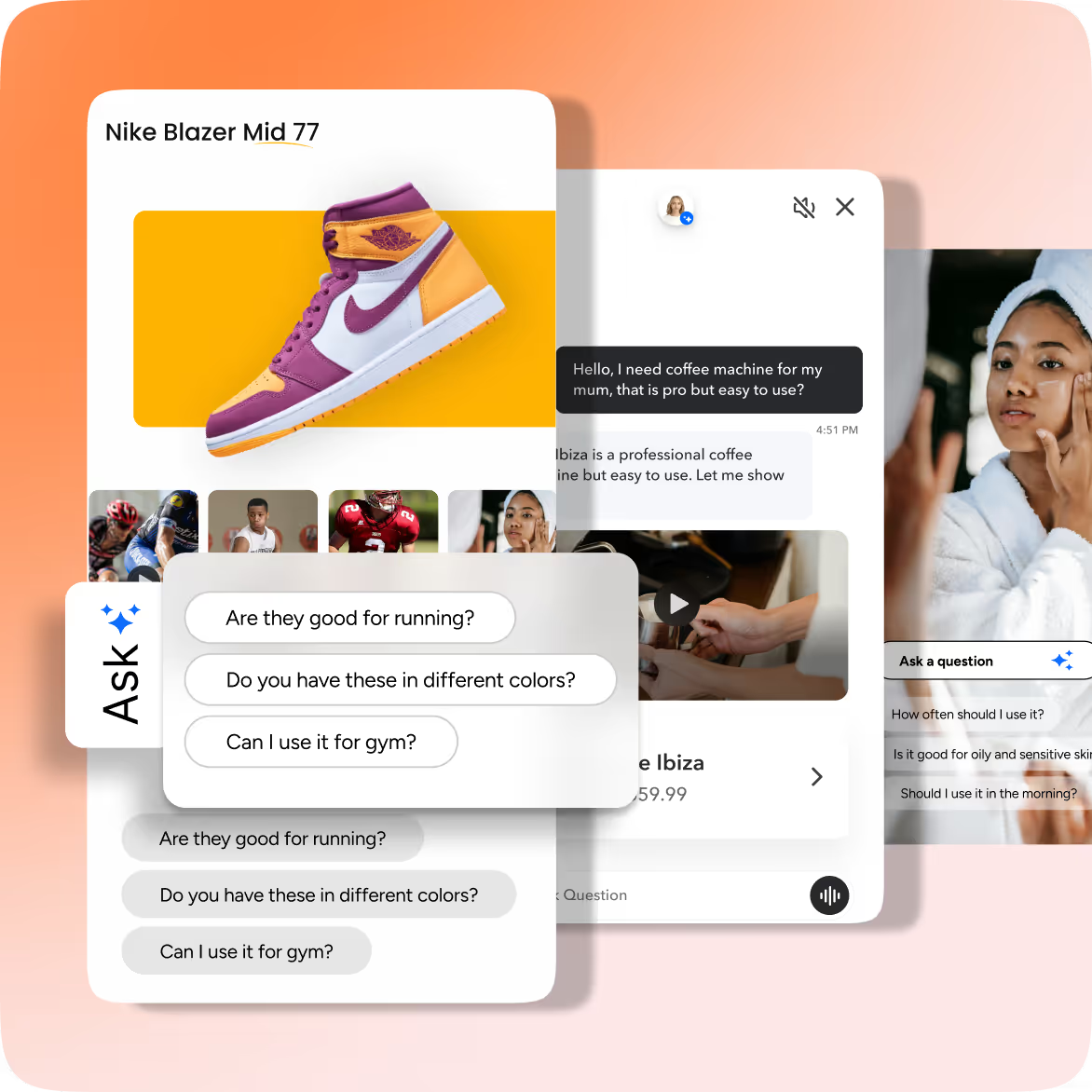
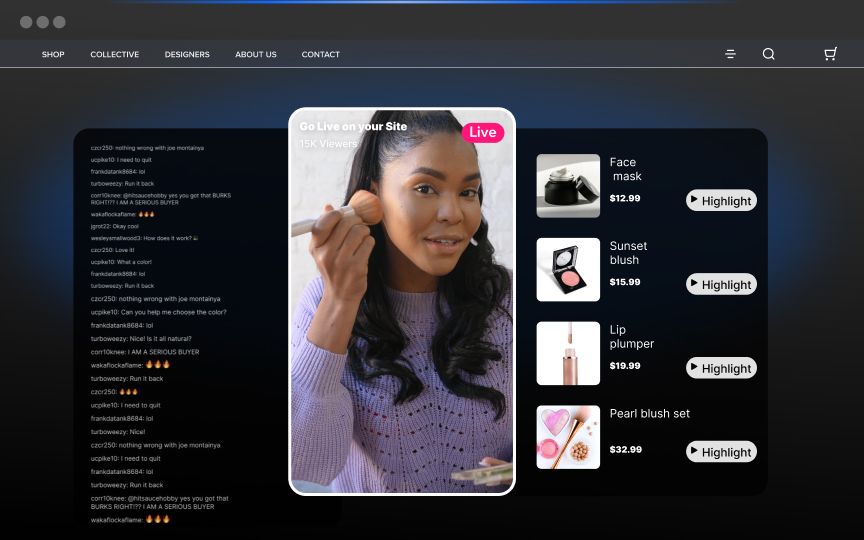
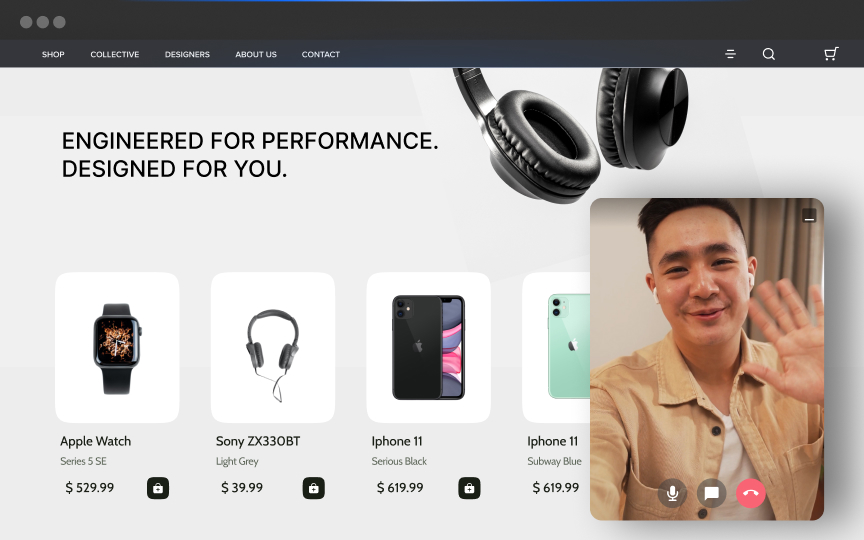


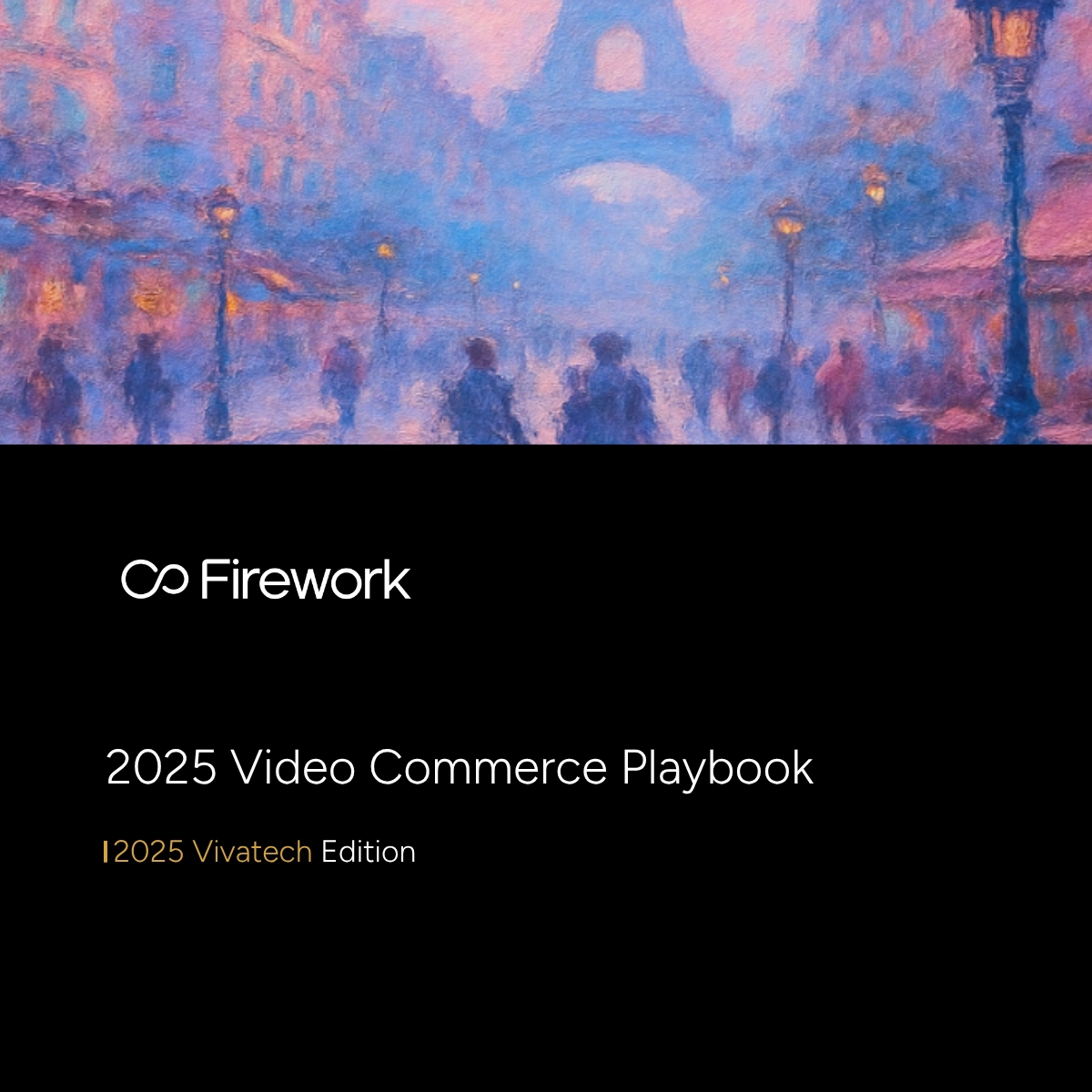



















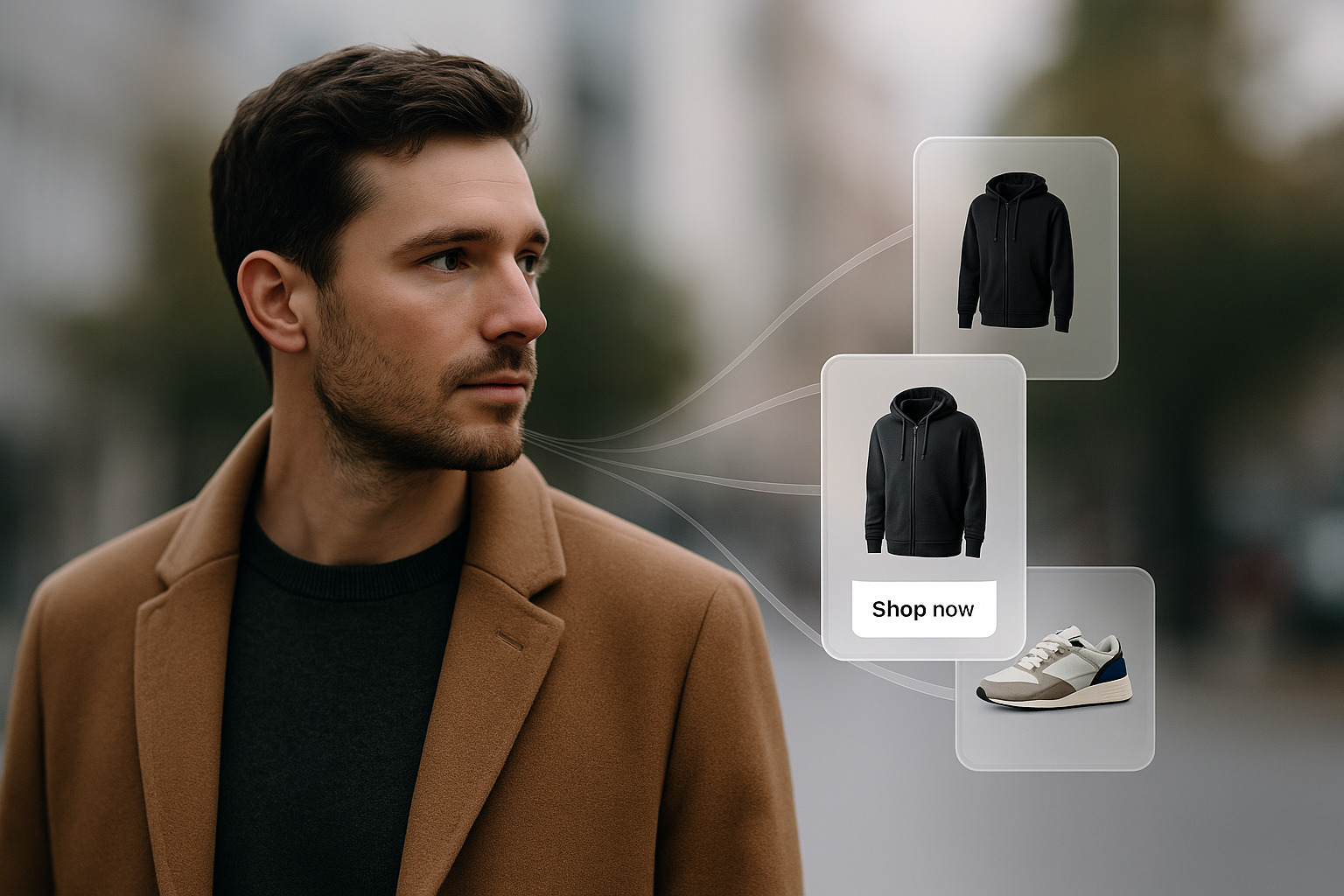

.png)

